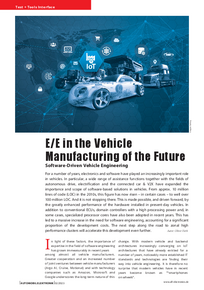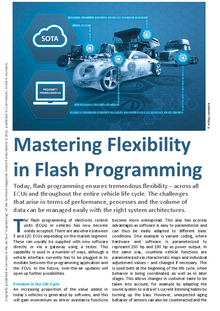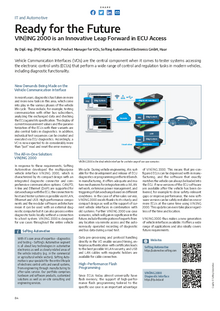Manufacturing Solutions
Innovative Solutions for the Fast and Efficient Execution of all Diagnostic and Test Tasks in Vehicle Manufacture

Current and future vehicles are increasingly equipped with state-of-the-art technologies. Complex and heterogeneous E/E architectures and different bus systems mean automotive manufacturers are constantly faced with new challenges, particularly in production – not least due to the massive increase in software package sizes of future vehicle generations of well over 1 GB. To meet the high demands on quality and performance in manufacturing, we support manufacturers with innovative production solutions in the realization of fast, efficient manufacturing processes.
Typical areas of application in vehicle production are flash programming, coding, parameterization, error detection and troubleshooting, function and end-of-line tests. In addition, we cover all aspects of diagnostics in ECU preparation, component testing and also after vehicle production. The preparation of the ECUs for manufacturing includes the programming of the ECUs with the necessary software and the corresponding configurations in line with vehicle specification. The function and quality of individual components or modules of a vehicle are tested on component test benches before they are installed in the vehicle. The different tests can be electrical tests, mechanical stress tests, performance tests or environmental tests. The aim is to ensure that the ECUs and components meet the specific requirements and work perfectly before they are integrated in the vehicle. Furthermore, we offer solutions for the independent programming of ECUs following vehicle production.
Use in Manufacturing
- (Flash) programming: remedying software errors, installing the current software version
- Integration and commissioning of vehicle electronics, individual systems as well as the entire vehicle
- System and component testing: execution of quality tests
- Error detection and troubleshooting
- Quality assurance & data logistics: monitoring and managing quality during manufacture
- End-of-line tests (EoL testing)
- Test bench connection: testing the vehicles and components on the test bench
- Testing and commissioning HV batteries and executing tests to ensure the correct commissioning of HV batteries
- Analysis of the operating data of vehicles for improvements in manufacturing
Benifits
- Increase in efficiency in vehicle manufacture thanks to reliable, high-performance diagnostic and test solutions
- Extremely high data transmission rates and speeds in vehicle manufacture
- Realization of completely new, highly flexible and decentral process sequences
- Optimization of the manufacturing processes for greater efficiency and cost saving
- Scalability, automation capability and flexible extension and migration possibilities
- Softing as a strong partner: extensive competence in diagnostics and connectivity including experience in series production at premium OEMs and years of experience in key technologies:
- Testing
- Inline flash programming
- Wi-Fi, 4G/5G
- Version management as well as distribution and update of software and/or data
- Fulfillment of performance, availability, backup and security requirements, including powerful security mechanisms (access protection, data and communication security as well as Security by Design adaptation)
Vehicle Manufacture in the Future
Challenge of the Speed of Data Transfer with the Increasing Size of Software Packages
Modern vehicle and backend architectures are increasingly converging with the IoT architectures deployed for many years now. As a result, more and more established IT standards and technologies are finding their way into vehicle engineering and manufacturing. There are, however, special challenges for the automotive industry due to complex, heterogeneous E/E architectures and different bus systems. Because the type of bus system significantly determines the duration of a software update process.
While high-performance on-board systems (high-performance computers, HPC) with proven software update methods can be updated over Ethernet with a data rate of up to 1 GBit/s, the transmission speed for downstream ECUs, e.g. over CAN-FD, is a max. 8 MBit/s. In addition, the corresponding user data rates do not increase linearly with the transmission speed. Software package sizes of future vehicle generations of well over 1 GB thus represent an immense challenge.
Do you have questions about our solutions or need support?
Please contact us – we are pleased about your interest!
Network Connectivity and Performance of a Smartphone Combined with the Vehicle Connectivity of a VCI
The hardware- and software-based capabilities of a Vehicle Communication Interface (VCI) are decisive for quality and performance in vehicle production. To be able to process the large software packages and implement powerful software processes in vehicle manufacture, digitalized manufacturing with a central data source and cloud technologies is what is now being aimed for. One solution would be to use smartphones as vehicle communication interfaces in manufacture.
Smartphones have high-performance processors (CPUs), large working memories, fast hardware interfaces and state-of-the-art wireless data transmission technology. By using smartphones, transmission speeds of 1,000 MBit/s and more can be achieved in manufacture. Equipped with peripherals for connecting to existing CAN/FD bus systems as well as interfaces for Automotive Ethernet and DoIP, smartphones can be used to achieve very high performance at affordable prices.
With what is referred to as a “Vehicle Communication Unit” (VCU) – the combination of a high-performance smartphone and vehicle diagnostic interface, Softing has an innovative solution with which the speed of software updates in manufacturing can be considerably increased. Near-vehicle VCUs make completely new, flexible and decentral E/E process sequences possible.
Products
Products | |
| VIN|ING 2000 | High-performance VCI for applications in manufacturing with WLAN, LAN and USB as interfaces to the host system as well as CAN/FD, K-Line and Ethernet to the vehicle |
| Softing SDE | End-of-line update and test system, for automated programming stations or in independent flash applications during vehicle shipping |
| Vehicle Communication Unit | The Vehicle Communication Unit combines the network connectivity and performance of a smartphone with the vehicle connectivity of a VCI for the challenging vehicle manufacture of the future in which top performance requirements must be met |
| Pocket Tester | VCI for the fast test of vehicles in the ongoing production process, final vehicle release or as a flexible mobile programming solution in post production |
| Test Systems | Function and HiL testers for almost all types of ECU, data acquisition systems and test automation platforms |












